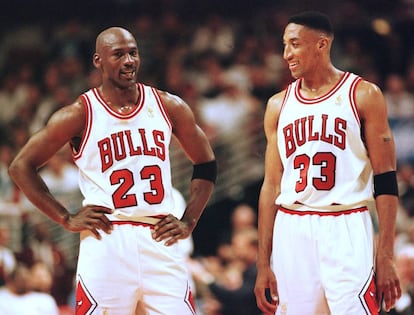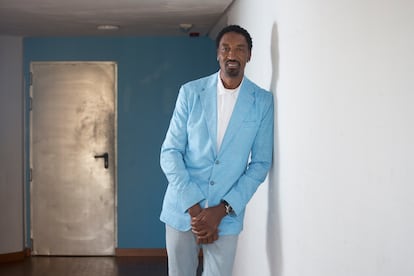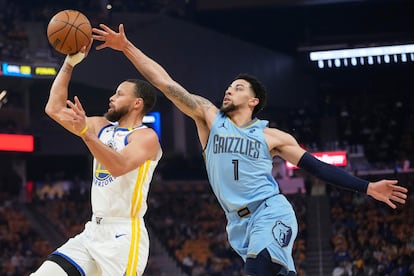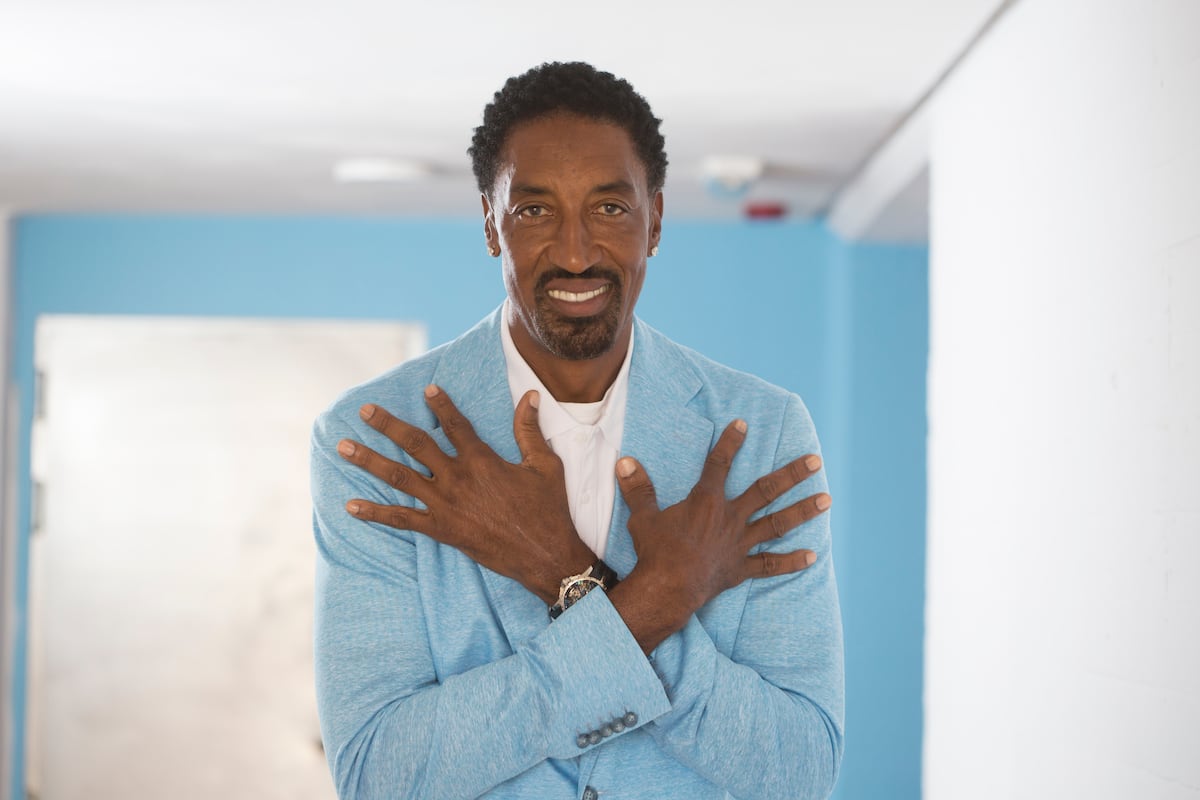Excited murmurs gather volume in the bowels of the Antonio Magariños sports center in Madrid when Scottie Pippen doesn’t walk in, but floats, slow and unfazed by the expectation his presence has generated. He hasn’t been back to Spain since the 1992 Barcelona Olympics, 33 years ago, the same number, he displays with his fingers, pleased with the coincidence, that he wore on his Chicago Bulls jersey, the team with which he won six NBA championships. “Spain has always treated me well,” he says while wiping his palms on mile-long thighs that once bounced like springs on the parquet floor. Now, less explosive, he speaks to EL PAÍS before conducting the honorary tipoff at the Inclusion All-Star organized by the Sanitas Foundation.
Question. Do you feel that you are still undervalued today?
Answer. No, not really. I never cared about praise. What happened to me just happened. I didn’t chase it. So no, I don’t feel undervalued. Not at all.
Q. Before your arrival, the Chicago Bulls had endured several losing seasons.
A. Yeah, and I don’t think a lot of people know that, so I’m glad you said that because it shows that you understand the game, and you have a little bit of knowledge about the history of the NBA and the Chicago Bulls.
Q. What did you contribute to that team?
A. Pure versatility. I had the ability to play in lots of positions and to defend a lot of different players. I also had a great understanding of the game, of course. In short, everything you need to win. It was like a blessing, really. I had exactly the skills the team needed to reach the next level. I fell into the right place at the right time.
Q. And you all got along on the court, but not off it.
A. Well, the important thing was to make that click inside, not outside. I understood the game, I knew how it worked and what it took to win, so I didn’t have to do anything outside of that. In the end, you don’t have to be friends, just teammates. Basketball is a team game, and it’s all about putting the right pieces together and making them work.
Q. On a scale from one to 10, how tired are you of talking about Michael Jordan?
A. Oh, [smiles]. Is 10 the highest or lowest score?
Q. The highest.
A. Well, I’d probably say a 12.
Q. More than 10?
A. Yeah, definitely, more than 10. At the end of the day, I’ve been used to it since the day I arrived in the NBA. It’s not something that surprises me: everything has always been about Michael Jordan. But, you know, I’m happy to have been able to leave my own legacy and not have to talk about him all the time.
 Michael Jordan and Scottie Pippen during a Chicago Bulls game.Getty
Michael Jordan and Scottie Pippen during a Chicago Bulls game.Getty
Q. How would you do in today’s NBA?
A. I’d be fine. The game has changed, it’s true; it’s more back-and-forth now, but I feel like my style was suited to those types of games in the 1980s and 1990s, too. I don’t think it would be a big challenge for me.
Q. Would you be the best player in the league?
A. Yeah, I think so. There’s no reason to think otherwise. If I put in the same effort I did back in my day, I feel like I’d easily be among the best.
Q. LeBron James, Kevin Durant, and Stephen Curry are perhaps the three greatest players of the last decade. Are they better than you were?
A. It’s hard to know that, because eras are different. I didn’t play in their era, and they didn’t play in mine. The truth is that they are, still today, extraordinary for the era in which they played; just as I was extraordinary in mine. I can’t take away one iota of credit for everything they’ve achieved. Nor can I criticize them. They are three of the best players of all time.
Q. The 1996 Chicago Bulls were often compared to the Golden State Warriors, who surpassed their record for wins in the 2016 regular season.
A. I don’t know who would win, honestly. First of all, what rules would the game be played by? Today’s rules or those from the 1980s? If we were playing in our time, I think we’d have an advantage, because we played a very physical game, different from what we see today. If the game were played in this era, it would be played more from the three-point line, with everything more open, more space, and a lot of pick and roll. It would be nice to see it, but we’ll never know what would have happened.
Q. You were named among the 75 greatest players in NBA history. If you were to rank them, where would you place?
A. Among the top five [smiles].
Q. Really?
A. No, but… You know, I’m glad to be on that team, but I don’t think you can say who’s number one or number two. I’m proud to be part of that list. Then, let the people decide.
 Scottie Pippen poses for EL PAÍS before the interview at the Antonio Magariños sports center in Madrid.Santi Burgos
Scottie Pippen poses for EL PAÍS before the interview at the Antonio Magariños sports center in Madrid.Santi Burgos
Q. The last American-born NBA MVP was James Harden, seven seasons ago. What happened?
A. Well, I think the European players have improved a lot. I feel like they’ve learned a lot from the American players. In fact, from the outside, it seems like they’ve put in a lot more hours in the gym than they have. They’re showing their dominance in the league, and that’s reflected in the MVP voting.
Q. It was harder to see in your time.
A. Yes, but in the end, I always wanted to be the best. I didn’t care who stood in my way, whether they were American, Black, white, European, or from wherever. I wanted to be the best. And to do that, I had to fight everyone.
Q. Who impresses you in today’s NBA?
A. There are a lot of players, but I’d probably go with Steph Curry, the best shooter in history. It’s true that he’s reaching the twilight of his career — I won’t say the end yet — but he’s still a spectacular player. Shooting is an art that, once you have it, you never lose it, and he has it in his genes. He could remain the best shooter in the world for another 10 years.
Q. Were you surprised by Luka Doncic’s trade to the Lakers?
A. Yeah, sure. Me and everyone else, but that’s how the business works. Franchises trade cards every so often, and Luka is no exception. It was a huge shock for everyone, especially because he’s such a great player, someone who came into the league very young and had an immediate impact from day one.
Q. Your son Scotty is now in his third season with the Memphis Grizzlies.
A. Yeah, and he’s doing great. He’s a born fighter. One of those guys who gives it his all on the court. He knows the NBA is a very tough challenge, but I think he’s finding his groove.
Q. Do you see anything of yourself in him?
A. Determination. He learned from a very young age to never give up. And that’s something I showed on the court, too.
 Scotty Pippen Jr., son of the former Bulls player, tries to block a shot by Stephen Curry.Jeff Chiu (AP)
Scotty Pippen Jr., son of the former Bulls player, tries to block a shot by Stephen Curry.Jeff Chiu (AP)
Q. Here in Spain, your name will always be associated with the Barcelona 1992 Olympic Games and that American “Dream Team.”
A. Yeah, I’m aware [smiles]. I remember it as a fantastic experience. It was the first time I played against players from outside the United States, and we had the opportunity to compete against a lot of other countries. We realized that American basketball was more advanced than that of any European country. The same can’t be said today.
Q. Beyond the gold medal, what is your best memory of Barcelona?
A. We stayed in a hotel that was just a block from La Rambla, which was already a very popular street. We weren’t allowed to leave the hotel, but, you know, we started to get a little claustrophobic from being stuck there for so long [smiles].
Q. You had a good time then.
A. Yeah, you could say we had a great time in Barcelona.
Q. Even today, there’s a lot of talk about those training games between the members of the Dream Team. What were they like?
A. They were very tough, but they helped us win gold in Barcelona. We were in several cities before the Games: Monte Carlo, San Diego, Portland… It was like an NBA All-Star tour. We’d never spent so much time together, and it helped us get to know each other as a group. The preparation was a lot of fun. We played games for hours, with no cameras. They were very physical duels and with a lot of trash talking, but we had a great time.
Q. Was that the best team you’ve ever played for?
A. Without a doubt. It was as if a magic hand had chosen the best players in the world and brought them together on one team. It’s impossible to gather more talent. We left an unforgettable legacy, setting a bar that’s hard to surpass.
Q. In the matches against Croatia at those Games, including the final, you tended to defend Toni Kukoc. Why?
A. Well, let’s just say I had to do it [smiles]. We weren’t teammates in Chicago yet, so I just wanted to make sure we won the gold medal. We had to show our dominance to the world.
Q. Later, he was a teammate of yours at the Chicago Bulls.
A. Yeah, and I think it was hard for him to get all the credit he maybe deserved. It was a similar thing with Kevin Durant and the Golden State Warriors. He was a champion there, always playing at an MVP level, but that was Steph, Klay, and Draymond’s team. It was a similar thing for Toni in Chicago. By the time he arrived, we were already established as a team. You can’t say he didn’t help us win, but he probably gave up some personal greatness in exchange for sacrificing for us and taking a few steps back.
Q. Now that you mention it, Durant is a big fan of Kukoc.
A. And I understand why. We’re talking about two NBA Hall of Famers.
Q. Before we finish, let’s get back to you. What was your weak point as a player?
A. Probably the outside shot. It was something I worked on a lot and eventually developed over time. I never reached Steph Curry’s level, but you could say the work paid off [smiles].
Q. What legacy do you think you have left?
A. I’d say I was a great teammate. In fact, I think I’ll be remembered as a great team player. A guy who understood the game and tried to make everyone around him better.
Sign up for our weekly newsletter to get more English-language news coverage from EL PAÍS USA Edition

